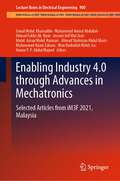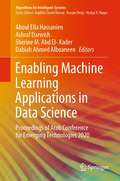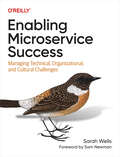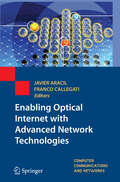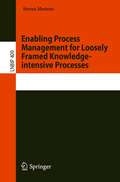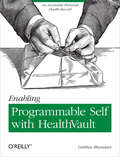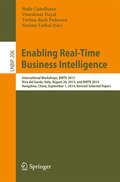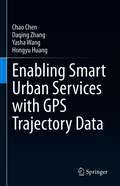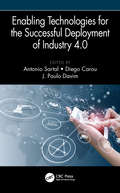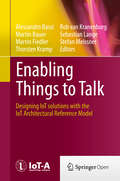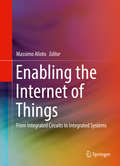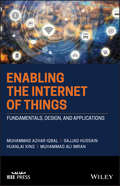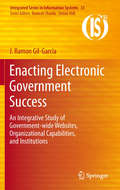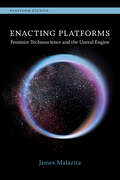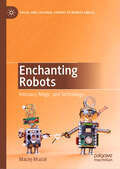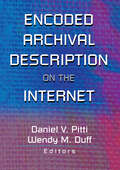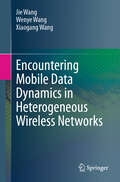- Table View
- List View
Enabling Industry 4.0 through Advances in Mechatronics: Selected Articles from iM3F 2021, Malaysia (Lecture Notes in Electrical Engineering #900)
by Anwar P. P. Abdul Majeed Jessnor Arif Mat Jizat Muhammad Aizzat Zakaria Ahmad Fakhri Ab. Nasir Ismail Mohd. Khairuddin Muhammad Amirul Abdullah Mohd. Azraai Mohd. Razman Ahmad Shahrizan Abdul Ghani Wan Hasbullah Mohd. IsaThis book presents part of the iM3F 2021 proceedings from the mechatronics track. It highlights key challenges and recent trends in mechatronics engineering and technology that are non-trivial in the age of Industry 4.0. It discusses traditional as well as modern solutions that are employed in the multitude spectra of mechatronics-based applications. The readers are expected to gain an insightful view on the current trends, issues, mitigating factors as well as solutions from this book.
Enabling Machine Learning Applications in Data Science: Proceedings of Arab Conference for Emerging Technologies 2020 (Algorithms for Intelligent Systems)
by Ashraf Darwish Aboul Ella Hassanien Sherine M. Abd El-Kader Dabiah Ahmed AlboaneenThis book gathers selected high-quality research papers presented at Arab Conference for Emerging Technologies 2020 organized virtually in Cairo during 21–23 June 2020. This book emphasizes the role and recent developments in the field of emerging technologies and artificial intelligence, and related technologies with a special focus on sustainable development in the Arab world. The book targets high-quality scientific research papers with applications, including theory, practical, prototypes, new ideas, case studies and surveys which cover machine learning applications in data science.
Enabling Microservice Success: Managing Technical, Organizational, and Cultural Challenges
by Sarah WellsMicroservices can be a very effective approach for delivering value to your organization and to your customers. If you get them right, microservices help you to move fast by making changes to small parts of your system hundreds of times a day. But if you get them wrong, microservices will just make everything more complicated.In this book, technical engineering leader Sarah Wells provides practical, in-depth advice for moving to microservices. Having built her first microservice architecture in 2013 for the Financial Times, Sarah discusses the approaches you need to take from the start and explains the potential problems most likely to trip you up. You'll also learn how to maintain the architecture as your systems mature while minimizing the time you spend on support and maintenance. With this book, you will:Learn the impact of microservices on software development patterns and practicesIdentify the organizational changes you need to make to successfully build and operate this architectureDetermine the steps you must take before you move to microservicesUnderstand the traps to avoid when you create a microservices architecture—and learn how to recover if you fall into one
Enabling Optical Internet with Advanced Network Technologies
by Javier Aracil Franco CallegatiThis reference provides an overview of the key concepts related to the major issues of optical Internet, and studies traditionally and recently proposed optical switching paradigms. The concise coverage presents a detailed comparison of optical switching technologies, and covers architectural issues together with topics such as signaling protocols and Quality of Service (QoS) provision. Additionally, the book provides deep insight into recent advances in optical circuit switching, optical packet switching (OPS) and optical burst switching (OBS) technologies; their performance advantages, their control-plane specifications, their enabling technologies, their applicability in today's networks, and their cost benefits. Readers need only undergraduate background in computer communication networks on topics related to TCP/IP, SDH and MPLS networks. This text will be a valuable resource for advanced undergraduates, beginning graduates, and researchers studying communications in Engineering and Computer Science.
Enabling Person-Centric Healthcare Using Ambient Assistive Technology, Volume 2: Personalized and Patient-Centric Healthcare Services in AAT (Studies in Computational Intelligence #1191)
by Akash Kumar Bhoi Paolo Barsocchi Filippo Palumbo Parvathaneni Naga SrinivasuThis book focuses more on the transformative impact of person-centric health care, where it explores cutting-edge advancements in integrating artificial intelligence and machine learning to deliver personalized and efficient care. Key topics include the application of predictive models for critical health conditions such as brain stroke, lung cancer, diabetes, and Alzheimer's, as well as the integration of secure frameworks to protect sensitive patient data. The book also covers advanced techniques for recognizing human activities in ambient environments, optimizing patient data clustering, and evaluating deep learning methods for unique use cases like yoga pose classification and resource optimization in smart healthcare. Designed for healthcare professionals, researchers, data scientists, and technologists, this book presents a harmonious blend of technical insights and practical applications, emphasizing person-centric approaches. By focusing on multi-disease prediction, assistive technologies, and enhanced emergency management, this book serves as a vital resource for innovating healthcare delivery in smart environments.
Enabling Person-Centric Healthcare Using Ambient Assistive Technology: Personalized and Patient-Centric Healthcare Services in AAT (Studies in Computational Intelligence #1108)
by Akash Kumar Bhoi Amik Garg Paolo Barsocchi Naga Srinivasu Parvathaneni Filippo PalumboThis book experiences the future of patient-centered healthcare and dives into the latest advancements and transformative technologies that are revolutionizing the well-being of individuals around the globe. The readers can join authors on an engaging journey as the authors explore the captivating realm of ambient assisted living and unlock its immense potential for improving healthcare outcomes. This book goes beyond mere exploration; it invites readers to embark on a voyage of discovery as authors unveil the outcomes of groundbreaking research ideas. With a diverse range of applications, from deep learning in healthcare to cutting-edge models, the authors offer a comprehensive view of the opportunities and challenges that lie ahead. Whether you're a healthcare professional, an academic seeking the latest insights, or a researcher delving into the realms of ambient assistive technology, biomedical engineering, or computational intelligence, this book is an invaluable resource. Additionally, postgraduate students pursuing data engineering systems find it to be an essential guide. Each chapter stands independently, providing a comprehensive overview of problem formulation and its tangible outcomes. The readers can immerse themselves in the world of patient-centered healthcare today and become part of the forefront of innovation.
Enabling Process Management for Loosely Framed Knowledge-intensive Processes (Lecture Notes in Business Information Processing #409)
by Steven MertensThis book is a revised version of the PhD dissertation written by the author at the Department of Business Informatics and Operations Management at Ghent University in Belgium.It addresses shortcomings in Business Process Management concerning loosely framed knowledge-intensive processes, which are characterized by their numerous valid process variants and their reliance on knowledge workers to apply their knowledge to decide on a suitable process variant that fits the context of a specific process execution. The goal was to lay the foundation for a process-aware business process management (IT-)system to support such processes. Several proof-of-concept implementations have been made for the core components and were evaluated in the domain of the healthcare. Starting from an artificial, but realistic, case about patients that arrive in the emergency room with suspected arm fractures and later progressing to a case study of the diagnosis and treatment of patients in the emergency department of a real hospital, using data from their patient files. In 2020, the PhD dissertation won the “CAiSE PhD award”, granted to outstanding PhD theses in the field of Information Systems Engineering.
Enabling Programmable Self with HealthVault: An Accessible Personal Health Record
by Vaibhav BhandariPersonal health and fitness has joined the digital revolution. Using Microsoft HealthVault, people interested in monitoring their health have an unprecedented opportunity to research their own data. This concise book explains how HealthVault users can collect and analyze their data, and how application developers can help them with mobile or web-based applications.You’ll learn how to use HealthVault’s open API, flexibility, and connections with multiple health-care providers to develop health data applications, enable automatic updates from well-known fitness devices, and use programming libraries to create reports and investigate trends.Get a walkthrough of HealthVault functionality available to end usersUse HealthVault to capture data from devices that measure a user’s healthExamine HealthVault’s API for interacting with applications and devices, using .NET code samplesDevelop a Quantified Self application for consumers that can track more than 80 data typesLearn how to build mobile apps for HealthVault by exploring an end-to-end example for Windows Phone 7Use best practices for releasing, maintaining, and marketing HealthVault applications to end users
Enabling Real-Time Business Intelligence
by Malu Castellanos Umeshwar Dayal Torben Bach Pedersen Nesime TatbulThis book constitutes the thoroughly refereed conference proceedings of the 7th International Workshop on Business Intelligence for the Real-Time Enterprise, BIRTE 2013, held in Riva del Garda, Italy, in August 2013 and of the 8th International Workshop on Business Intelligence for the Real-Time Enterprise, BIRTE 2014, held in Hangzhou, China, in September 2014, in conjunction with VLDB 2013 and 2014, the International Conference on Very Large Data Bases. The BIRTE workshop series provides a forum for the discussion and advancement of the science and engineering enabling real-time business intelligence and the novel applications that build on these foundational techniques. This volume contains five full, two short, and two demo papers, which were carefully reviewed and selected with an acceptance rate of 45%. In addition, one keynote and three invited papers are included.
Enabling Secure and Privacy Preserving Communications in Smart Grids
by Hongwei LiThis brief focuses on the current research on security and privacy preservation in smart grids. Along with a review of the existing works, this brief includes fundamental system models, possible frameworks, useful performance, and future research directions. It explores privacy preservation demand response with adaptive key evolution, secure and efficient Merkle tree based authentication, and fine-grained keywords comparison in the smart grid auction market. By examining the current and potential security and privacy threats, the author equips readers to understand the developing issues in smart grids. The brief is designed for researchers and professionals working with computer communication networks and smart grids. Graduate students interested in networks and communication engineering will also find the brief an essential resource.
Enabling Smart Urban Services with GPS Trajectory Data
by Daqing Zhang Chao Chen Hongyu Huang Yasha WangWith the proliferation of GPS devices in daily life, trajectory data that records where and when people move is now readily available on a large scale. As one of the most typical representatives, it has now become widely recognized that taxi trajectory data provides rich opportunities to enable promising smart urban services. Yet, a considerable gap still exists between the raw data available, and the extraction of actionable intelligence. This gap poses fundamental challenges on how we can achieve such intelligence. These challenges include inaccuracy issues, large data volumes to process, and sparse GPS data, to name but a few. Moreover, the movements of taxis and the leaving trajectory data are the result of a complex interplay between several parties, including drivers, passengers, travellers, urban planners, etc. In this book, we present our latest findings on mining taxi GPS trajectory data to enable a number of smart urban services, and to bring us one step closer to the vision of smart mobility. Firstly, we focus on some fundamental issues in trajectory data mining and analytics, including data map-matching, data compression, and data protection. Secondly, driven by the real needs and the most common concerns of each party involved, we formulate each problem mathematically and propose novel data mining or machine learning methods to solve it. Extensive evaluations with real-world datasets are also provided, to demonstrate the effectiveness and efficiency of using trajectory data. Unlike other books, which deal with people and goods transportation separately, this book also extends smart urban services to goods transportation by introducing the idea of crowdshipping, i.e., recruiting taxis to make package deliveries on the basis of real-time information. Since people and goods are two essential components of smart cities, we feel this extension is bot logical and essential. Lastly, we discuss the most important scientific problems and open issues in mining GPS trajectory data.
Enabling Systems for Intelligent Manufacturing in Industry 4.0: Sensing, Smart and Sustainable Systems for the Design of S3 Products, Processes, Manufacturing Systems, and Enterprises
by Arturo Molina Pedro Ponce Jhonattan Miranda Daniel CortésThis book introduces the concept of sensing, smart and sustainable systems (S3 systems) to support the design and redesign of products, services, business and manufacturing processes, manufacturing systems, and enterprises. The concept of S3 systems theory is introduced and explained in detail to support designers and engineers in their development task. This approach is embraced in the implementation of emergent Information and communication technologies and artificial intelligence techniques. The text helps the reader to understand the relationship between intelligent manufacturing, S3 systems and Industry 4.0. It presents a review of current approaches to design and development of technology-based products. Finally, it enlarges on the sensing, smart and sustainable systems theory to give examples of S3 systems as case studies.
Enabling Technologies for Effective Planning and Management in Sustainable Smart Cities
by Bharat Bhushan Mohd Abdul Ahad Gabriella CasalinoWith the rapid penetration of technology in varied application domains, the existing cities are getting connected more seamlessly. Cities becomes smart by inducing ICT in the classical city infrastructure for its management. According to McKenzie Report, about 68% of the world population will migrate towards urban settlements in near future. This migration is largely because of the improved Quality of Life (QoL) and livelihood in urban settlements. In the light of urbanization, climate change, democratic flaws, and rising urban welfare expenditures, smart cities have emerged as an important approach for society’s future development. Smart cities have achieved enhanced QoL by giving smart information to people regarding healthcare, transportation, smart parking, smart traffic structure, smart home, smart agronomy, community security etc. Typically, in smart cities data is sensed by the sensor devices and provided to end users for further use. The sensitive data is transferred with the help of internet creating higher chances for the adversaries to breach the data. Considering the privacy and security as the area of prime focus, this book covers the most prominent security vulnerabilities associated with varied application areas like healthcare, manufacturing, transportation, education and agriculture etc. Furthermore, the massive amount of data being generated through ubiquitous sensors placed across the smart cities needs to be handled in an effective, efficient, secured and privacy preserved manner. Since a typical smart city ecosystem is data driven, it is imperative to manage this data in an optimal manner. Enabling technologies like Internet of Things (IoT), Natural Language Processing (NLP), Blockchain Technology, Deep Learning, Machine Learning, Computer vision, Big Data Analytics, Next Generation Networks and Software Defined Networks (SDN) provide exemplary benefits if they are integrated in the classical city ecosystem in an effective manner. The application of Artificial Intelligence (AI) is expanding across many domains in the smart city, such as infrastructure, transportation, environmental protection, power and energy, privacy and security, governance, data management, healthcare, and more. AI has the potential to improve human health, prosperity, and happiness by reducing our reliance on manual labor and accelerating our progress in the sciences and technologies. NLP is an extensive domain of AI and is used in collaboration with machine learning and deep learning algorithms for clinical informatics and data processing. In modern smart cities, blockchain provides a complete framework that controls the city operations and ensures that they are managed as effectively as possible. Besides having an impact on our daily lives, it also facilitates many areas of city management.
Enabling Technologies for Next Generation Wireless Communications (Artificial Intelligence (AI): Elementary to Advanced Practices)
by Mohammed Usman Mohd Wajid Mohd Dilshad AnsariEnabling Technologies for Next Generation Wireless Communications provides up-to-date information on emerging trends in wireless systems, their enabling technologies and their evolving application paradigms. This book includes the latest trends and developments toward next generation wireless communications. It highlights the requirements of next generation wireless systems, limitations of existing technologies in delivering those requirements and the need to develop radical new technologies. It focuses on bringing together information on various technological developments that are enablers vital to fulfilling the requirements of future wireless communication systems and their applications. Topics discussed include spectrum issues, network planning, signal processing, transmitter, receiver, antenna technologies, channel coding, security and application of machine learning and deep learning for wireless communication systems. The book also provides information on enabling business models for future wireless systems. This book is useful as a resource for researchers and practitioners worldwide, including industry practitioners, technologists, policy decision-makers, academicians, and graduate students.
Enabling Technologies for the Successful Deployment of Industry 4.0 (Manufacturing Design and Technology)
by J. Paulo Davim Diego Carou Antonio SartalThis book offers the latest research advances in the field of Industry 4.0, focusing on enabling technologies for its deployment in a comprehensive way. This book offers successful implementation of technologies such as artificial intelligence, augmented and virtual reality, autonomous and collaborative robots, cloud computing, and up-to-date guidelines. It investigates how the technologies and principles surrounding Industry 4.0 (e.g., interoperability, decentralized decisions, information transparency, etc.) serve as support for organizational routines and workers (and vice versa). Included are applications of technologies for different sectors and environments as well as for the supply chain management. It also offers a domestic and international mix of case studies that spotlight successes and failures. Features Provides a historical review of Industry 4.0 and its roots Discusses the applications of technologies in different sectors and environments (e.g., public vs. private) Presents key enabling technologies for successful implementation in any industrial and service environment Offers case studies of successes and failures to illustrate how to put theory into practice Investigates how technologies serve as support for organizational routines and workers
Enabling Things to Talk
by Martin Bauer Alessandro Bassi Martin Fiedler Thorsten Kramp Rob Kranenburg Sebastian Lange Stefan MeissnerThe Internet of Things (IoT) is an emerging network superstructure that will connect physical resources and actual users. It will support an ecosystem of smart applications and services bringing hyper-connectivity to our society by using augmented and rich interfaces. Whereas in the beginning IoT referred to the advent of barcodes and Radio Frequency Identification (RFID), which helped to automate inventory, tracking and basic identification, today IoT is characterized by a dynamic trend toward connecting smart sensors, objects, devices, data and applications. The next step will be "cognitive IoT," facilitating object and data re-use across application domains and leveraging hyper-connectivity, interoperability solutions and semantically enriched information distribution. The Architectural Reference Model (ARM), presented in this book by the members of the IoT-A project team driving this harmonization effort, makes it possible to connect vertically closed systems, architectures and application areas so as to create open interoperable systems and integrated environments and platforms. It constitutes a foundation from which software companies can capitalize on the benefits of developing consumer-oriented platforms including hardware, software and services. The material is structured in two parts. Part A introduces the general concepts developed for and applied in the ARM. It is aimed at end users who want to use IoT technologies, managers interested in understanding the opportunities generated by these novel technologies, and system architects who are interested in an overview of the underlying basic models. It also includes several case studies to illustrate how the ARM has been used in real-life scenarios. Part B then addresses the topic at a more detailed technical level and is targeted at readers with a more scientific or technical background. It provides in-depth guidance on the ARM, including a detailed description of a process for generating concrete architectures, as well as reference manuals with guidelines on how to use the various models and perspectives presented to create a concrete architecture. Furthermore, best practices and tips on how system engineers can use the ARM to develop specific IoT architectures for dedicated IoT solutions are illustrated and exemplified in reverse mapping exercises of existing standards and platforms.
Enabling the Internet of Things
by Massimo AliotoThis book offers the first comprehensive view on integrated circuit and system design for the Internet of Things (IoT), and in particular for the tiny nodes at its edge. The authors provide a fresh perspective on how the IoT will evolve based on recent and foreseeable trends in the semiconductor industry, highlighting the key challenges, as well as the opportunities for circuit and system innovation to address them. This book describes what the IoT really means from the design point of view, and how the constraints imposed by applications translate into integrated circuit requirements and design guidelines. Chapter contributions equally come from industry and academia. After providing a system perspective on IoT nodes, this book focuses on state-of-the-art design techniques for IoT applications, encompassing the fundamental sub-systems encountered in Systems on Chip for IoT: ultra-low power digital architectures and circuits low- and zero-leakage memories (including emerging technologies) circuits for hardware security and authentication System on Chip design methodologies on-chip power management and energy harvesting ultra-low power analog interfaces and analog-digital conversion short-range radios miniaturized battery technologies packaging and assembly of IoT integrated systems (on silicon and non-silicon substrates). As a common thread, all chapters conclude with a prospective view on the foreseeable evolution of the related technologies for IoT. The concepts developed throughout the book are exemplified by two IoT node system demonstrations from industry. The unique balance between breadth and depth of this book: enables expert readers quickly to develop an understanding of the specific challenges and state-of-the-art solutions for IoT, as well as their evolution in the foreseeable future provides non-experts with a comprehensive introduction to integrated circuit design for IoT, and serves as an excellent starting point for further learning, thanks to the broad coverage of topics and selected references makes it very well suited for practicing engineers and scientists working in the hardware and chip design for IoT, and as textbook for senior undergraduate, graduate and postgraduate students ( familiar with analog and digital circuits).
Enabling the Internet of Things: Fundamentals, Design and Applications (Wiley - IEEE)
by Muhammad Ali Imran Sajjad Hussain Muhammad Azhar Iqbal Huanlai XingLEARN MORE ABOUT FOUNDATIONAL AND ADVANCED TOPICS IN INTERNET OF THINGS TECHNOLOGY WITH THIS ALL-IN-ONE GUIDE Enabling the Internet of Things: Fundamentals, Design, and Applications delivers a comprehensive starting point for anyone hoping to understand the fundamentals and design of Internet of Things (IoT) systems. The book's distinguished academics and authors offer readers an opportunity to understand IoT concepts via programming in an abstract way. Readers will learn about IoT fundamentals, hardware and software components, IoT protocol stacks, security, IoT applications and implementations, as well as the challenges, and potential solutions, that lie ahead. Readers will learn about the social aspects of IoT systems, as well as receive an introduction to the Blockly Programming Language, IoT Microcontrollers, IoT Microprocessors, systems on a chip and IoT Gateway Architecture. The book also provides implementation of simple code examples in Packet Tracer, increasing the usefulness and practicality of the book. Enabling the Internet of Things examines a wide variety of other essential topics, including: The fundamentals of IoT, including its evolution, distinctions, definitions, vision, enabling technologies, and building blocks An elaboration of the sensing principles of IoT and the essentials of wireless sensor networks A detailed examination of the IoT protocol stack for communications An analysis of the security challenges and threats faced by users of IoT devices, as well as the countermeasures that can be used to fight them, from the perception layer to the application layer Perfect as a supplementary text for undergraduate students taking computer science or electrical engineering courses, Enabling the Internet of Things also belongs on the bookshelves of industry professionals and researchers who regularly work with and on the Internet of Things and who seek a better understanding of its foundational and advanced topics.
Enabling the Internet of Value: How Blockchain Connects Global Businesses (Future of Business and Finance)
by Paolo Tasca Jiahua Xu Nikhil VadgamaThis book shows how blockchain technology can transform the Internet, connecting global businesses in disruptive ways. It offers a comprehensive and multi-faceted examination of the potential of distributed ledger technology (DLT) from a new perspective: as an enabler of the Internet of Value (IoV). The authors discuss applications of blockchain technology to the financial services domain, e.g. in real estate, insurance and the emerging Decentralised Finance (DeFi) movement. They also cover applications to the media and e-commerce domains. DLT’s impacts on the circular economy, marketplace, Internet of Things (IoT) and oracle business models are also investigated. In closing, the book provides outlooks on the evolution of DLT, as well as the systemic governance and privacy risks of the IoV. The book is intended for a broad readership, including students, researchers and industry practitioners.
Enacting Electronic Government Success
by J. Ramon Gil-GarciaMany countries around the world are investing a great amount of resources in government IT initiatives. However, few of these projects achieve their stated goals and some of them are complete failures. Therefore, understanding e-government success has become very important and urgent in recent years. In order to develop relevant knowledge about this complex phenomenon, researchers and practitioners need to identify and assess what are the main conditions, variables, or factors that have an impact on e-government success. However, before being able to evaluate these impacts, it is necessary to define what e-government success is and what some e-government success measures are. This book presents a review of both e-government success measures and e-government success factors. It also provides empirical evidence from quantitative analysis and two in-depth case studies. Although based on sound theory and rigorous empirical analysis, the book not only significantly contributes to academic knowledge, but also includes some practical recommendations for government officials and public managers. Theoretically, the book proposes a way to quantitatively operationalize Fountain's enactment framework. Based on the institutional tradition, the technology enactment framework attempts to explain the effects of organizational forms and institutional arrangements on the information technology used by government agencies. According to Fountain (1995; 2001) the technology enactment framework pays attention to the relationships among information technology, organizations, embeddedness, and institutions. This framework is very well known in the e-government field, but is normally used for qualitative analysis and there is no previous proposal of how to use it with quantitative data. The book proposes variables to measure each of the different constructs in this framework and also tests the relationships hypothesized by Fountain's theory. Finally, using the advantages of the selected quantitative analysis technique (Partial Least Squares), the study also proposes some adjustments and extensions to the original framework in a theory building effort. Methodologically, the book reports on one of the first multi-method studies in the field of e-government in general and e-government success in particular. This study uses a nested research design, which combines statistical analysis with two in depth case studies. The study begins with a statistical analysis using organizational, institutional, and contextual factors as the independent variables. An overall score representing e-government success in terms of the functionality of state websites is the dependent variable. Second, based on the statistical results two cases are selected based on their relative fitness to the model (residuals) and their position in the general ranking of website functionality (which includes four different measures). In order to complement the results of the statistical analysis, case studies were developed for the two selected states (New York and Indiana), using semi-structured interviews and document analysis. In terms of the statistical analysis, the book constitutes one of the first applications of Partial Least Squares (PLS) to an e-government success study. PLS is a structural equations modeling (SEM) technique and, therefore, allows estimating the measurement model and the structural model simultaneously. The use of this sophisticated statistical strategy helped to test the relationships between e-government success and different factors influencing it, as well as some of the relationships between several of the factors, thus allowing exploring some indirect effects too.
Enacting Platforms: Feminist Technoscience and the Unreal Engine (Platform Studies)
by James MalazitaAn analysis of the game engine Unreal through feminist, race, and queer theories of technology and media, as well as a critique of the platform studies framework itself.In this first scholarly book on the Unreal game engine, James Malazita explores one of the major contemporary game development platforms through feminist, race, and queer theories of technology and media, revealing how Unreal produces, and is produced by, broader intersections of power. Enacting Platforms takes a novel critical platform studies approach, raising deeper questions: what are the material and cultural limits of platforms themselves? What is the relationship between the analyst and the platform of study, and how does that relationship in part determine what &“counts&” as the platform itself? Malazita also offers a forward-looking critique of the platform studies framework itself.The Unreal platform serves as a kind of technical and political archive of the games industry, highlighting how the techniques and concerns of games have shifted and accreted over the past 30 years. Today, Unreal is also used in contexts far beyond games, including in public communication, biomedical research, civil engineering, and military simulation and training. The author&’s depth of technical analysis, combined with new archival findings, contributes to discussions of topics rarely covered in games studies (such as the politics of graphical rendering algorithms), as well as new readings of previously &“closed&” case studies (such as the engine&’s entanglement with the US military and American masculinity in America&’s Army). Culture, Malazita writes, is not &“built into&” software but emerges through human practices with code.
Enchanting Robots: Intimacy, Magic, and Technology (Social and Cultural Studies of Robots and AI)
by Maciej MusiałThis book argues that robots are enchanting humans (as potential intimate partners), because humans are enchanting robots (by performing magical thinking), and that these processes are a part of a significant re-enchantment of the “modern” world. As a foundation, the author examines arguments for and against intimate relationships with robots, particularly sex robots and care robots. Moreover, the book provides a consideration of human-robot interactions and philosophical reflections about robots through the lens of magic and magical thinking as well as theoretical and practical re-evaluations of their status and presence. Furthermore, the author discusses the abovementioned issues in the context of disenchantment and re-enchantment of the world, characterizing modernity as a coexistence of these two processes. The book closes with a consideration of future scenarios regarding the meaning of life in the age of rampant automation and the possibility that designing robots becomes a sort of new eugenics as a consequence of recognizing robots as persons.
Encoded Archival Description on the Internet
by Wendy Duff Daniel V PittiArchivists and librarians: here is the perfect introduction to archival description and its latest technological applications! Encoded Archival Description on the Internet introduces a variety of perspectives that will assist you in deciding whether EAD is an appropriate tool in a given context and, if it is, provides the knowledge you need to begin planning, organizing, and implementing projects and programs in your library. This informative book: shows how archival description differs from bibliographic description presents EAD as a standard and shows its relation to the MARC format and other standards discusses implementation issues examines museum use of EAD gives you an overview of the history of the development of EAD explores the reference implications of EAD discusses implications for nontraditional users examines the concept of union-universal access to archivesEAD version 1.0 was formally released by the Society of American Archivists and the Library of Congress Network Development and MARC Standards Office in autumn 1998. Since then, a great number of institutions have invested significant time and money to prepare for implementation of EAD programs. The most compelling reason for EAD’s success is that, in the words of Editors Pitti and Duff, “Archivists recognize in EAD their shared principles and practice, and have embraced EAD not as a full realization of all of their expectations, but as common ground upon which they can negotiate and realize the future of one of the profession’s central responsibilities.”Encoded Archival Description on the Internet shows how EAD will not only benefit the public, but also librarians and archivists. It describes how information professionals will now be able to easily share information about complementary records and collections and to “virtually” integrate collections related by provenance but dispersed administratively or by geographic distance.
Encountering Mobile Data Dynamics in Heterogeneous Wireless Networks
by Wenye Wang Jie Wang Xiaogang WangThis book offers a systematic view of data services in heterogeneous wireless networks, from the perspectives of cause, governing rules, and impact of data’s mobility on such networks. Specifically, it covers application requirements break-down, network modeling, performance analysis and evaluation by examining mobile data dynamics that are particularly important to data service provisioning. Additionally, application prospects such as information dissemination, fog computing, Internet-of-Things and dynamic spectrum access are discussed on the basis of these dynamics. Theoretic analysis, example illustrations, and algorithms are also presented to provide a concise coverage of this important area of networking. Mobile data dynamics refers to the stochastic processes of information, geographical coverage and spectrum, which accompanies the movements of data across wireless networks. Owing to the challenge raised by a high level of network heterogeneity, and the innate requirement on scalability, knowledge on the evolution of mobile data dynamics is essential to the design and deployment of emerging data services and applications, such as Internet-of-Things, data/task offloading and edge-based machine learning/inference. This book is designed for researchers and advanced-level students in the field of wireless networking and edge computing, who seek to understand the models and evolutions of mobile data dynamics for future edge applications. Practitioners, who specialize in the design, operation and maintenance of edge computing systems will also want to purchase this book as a reference.
Encounters in End City: The Unofficial Minecrafters Academy Series, Book Six (Unofficial Minecrafters Academy #6)
by Winter MorganIt’s graduation week at Minecrafters Academy, but a battle is brewing between the top five students at the school. With the school’s top five students wrapped up in an endless prank war as they compete over the coveted position of class speaker, one of their classmates finds a solution: the students will travel to an End city and hunt for treasure; the student who not only survives, but returns with the most treasures, will be chosen. The students set off on their journey, but they quickly learn that the End is no joke. Face-to-face with shulkers, the deadly Void, and the mighty Ender Dragon, the school’s top students learn there’s more to success than making the grade. They must learn to fight together—or no one will make it back alive.In this final installment of the Unofficial Minecrafters Academy series, the risks—and the potential rewards—are greater than ever.
